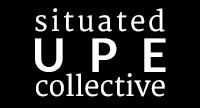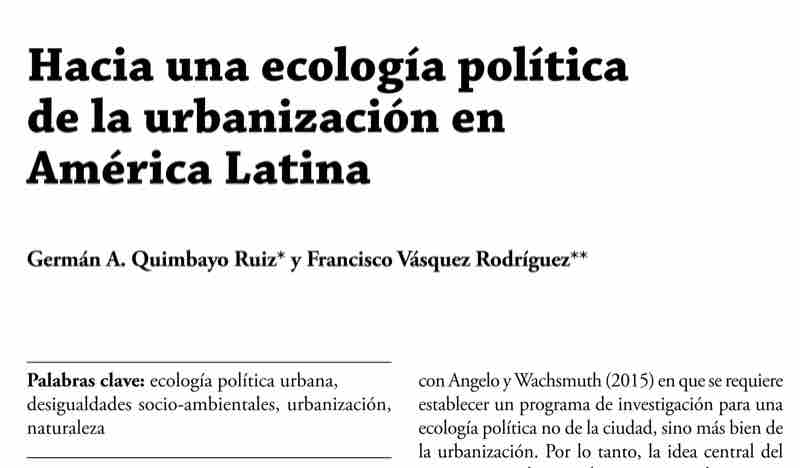
German Quimbayo Ruiz reports on efforts to develop a Situated UPE approach in Latin America. His co-authored research article in the journal Ecología Política is in Spanish, so spread the message among our Spanish-speaking scholars and activists. (For a PDF copy, contact the authors. For more SUPE posts on Latin America, see here.)
Recently I published a paper with Francisco Vásquez about the requirement of a comprehensive framework to understand the political ecology of urbanization in Latin America. The paper built upon the postcolonial perspectives that Mary Lawhon, Henrik Ernstson and Jonathan Silver developed in their Antipode paper in 2014, which was based on their experiences from working in African cities. Our paper summarizes wider debates within urban political ecology, and tries to integrate the analysis of uneven development and urbanisation (see for instance David Harvey, 2012), but from a Latin American perspective.
Departing from this line of thinking we strive to develop some grounds for a political ecological research-action agenda in and through Latin American cities and urbanization. We first identify a need to better understand how unequal socio-ecological urban changes in the region can be linked to methods and knowledge production of various social movements and uprisings across Latin American cities and urban areas. We then propose ideas, in conversation with these movements, of how to re-think and promote proper democratic participation in the production and reproduction of social relations between people, and amongst people and the environment.
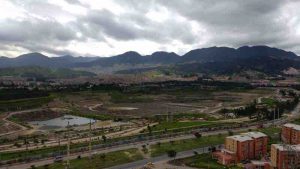
Photo of Southern parts of Bogotá.
Encouraged by scholars like Arturo Escobar, who recently claimed that Latin American critical though is more vibrant than ever, we feel there is fertile ground to develop a Situated UPE agenda that can help to link struggles in urban spaces with contestations of broader processes of exploitation.
Situated UPE and “neo-extractivism”
In particular we are interested in exploitation processes that have recently been called “new developmentalism” and “neo-extractivism”. These concepts, as reviewed in an article from 2014 by Hans-Jürgen Burchardt and Kristina Dietz*, refer to a set of state-led growth-oriented development paths embodied in extraction and exploitation activities. These include mining, hydrocarbon, and land grabbing for food and energy industries and has been accompanied with promises from national governments to use revenues collected from these exploitation activities to improve citizens’ living conditions.
While these polices might signal, as Burchard and Dietz writes, a “renaissance of the developmental state” (ibid., p. 468), it is crucial to understand that these processes are highly contested in Latin America as they are tied to more general patterns of uneven geographical development. This includes socio-spatial and socio-ecological contradictions, territorial transformations, and “the reordering of landscapes, and of social and labor relations” (ibid, p. 468; see also North and Grinspun 2016 for a more recent review).
We argue that there is a lack of critical reflection on how these extraction activities are related to urban socio-ecological injustices, and also how they link to rural struggles and processes. Using a Situated UPE perspective we hope to draw on historical case studies and contemporary ongoing struggles to take stock of how local and everyday settings operate as locus to ignite and develop new innovative forms of struggling for decent living conditions in urban landscapes.
For more information, please find our publication in the journal Ecología Política, issue 51, pages 43-51 which is published in Barcelona, entitled: “Hacia una ecología política de la urbanización en América Latina”.
By Germán Andrés Quimbayo Ruiz
* As noted by Buchardt and Dietz (2014) “new developmentalism” and “neo-extractivism” was first introduced by Uruguayan social scientist Eduardo Gudynas in 2009.
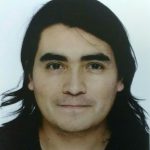
Germán Quimbayo
Germán Andrés Quimbayo Ruiz is from Bogotá, Colombia. He has a background in ecology and geography (MSc.), and has worked as a consultant with several institutions and authorities in Bogotá. He is doing a PhD in Environmental Policy at University of Eastern Finland, Joensuu Campus. His doctoral project is related with social movements, environmental concerns and urban policy in Bogotá.
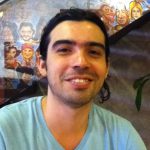
Francisco Vasquez
Francisco Vásquez Rodríguez is Chilean based in Colombia and is working as independent researcher on Urban Political Ecology in Latin America. He has a special interest in the socio-environmental inequalities resulting from neoliberal urbanization of nature.
References
Burchardt, H.-J. & Dietz, K., 2014. (Neo-)extractivism – a new challenge for development theory from Latin America. Third World Quarterly, 35(3), pp.468–486.
Gudynas, Eduardo. (2009) “Diez Tesis Urgentes sobre el Nuevo Extractivismo: Contextos y Demandas Bajo el Progresismo Sudamericano Actual.” In Extractivismo, Política y Sociedad, edited by Jürgen Schuldt, Alberto Acosta, Alberto Barandiará, Anthony Bebbington, Mauricio Folchi, CEDLA, Alejandra Alayza and Eduardo Gudynas, 187–225. Quito: CAAP/CLAES.
Harvey, David (2012). Rebel Cities: From the Right to the City to the Urban Revolution.
Lawhon, Mary, Henrik Ernstson, and Jonathan Silver (2014). “Provincializing Urban Political Ecology”, Antipode, 46 (2), pp. 497-516.
North, L.L. & Grinspun, R., 2016. Neo-extractivism and the new Latin American developmentalism: the missing piece of rural transformation. Third World Quarterly, 6597(April), pp.1–22.
Quimbayo Ruiz, Germán Andrés and Francisco Vásquez Rodríguez (2016). “Hacia una ecología política de la urbanización en América Latina”. Ecología Política. 51:43-51. Barcelona.
—-
Blog post edited, moderated and uploaded by Henrik Ernstson, 7 Dec 2016.
